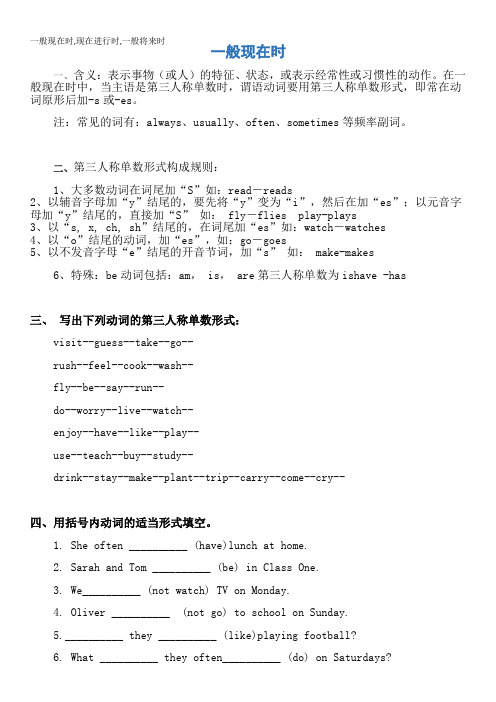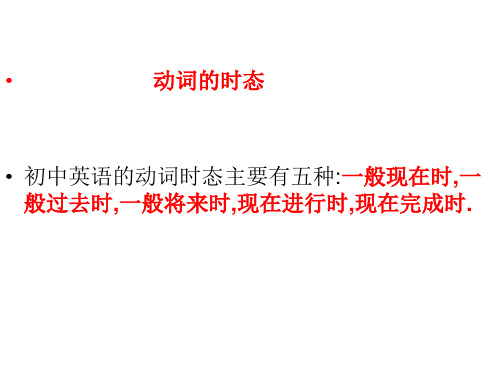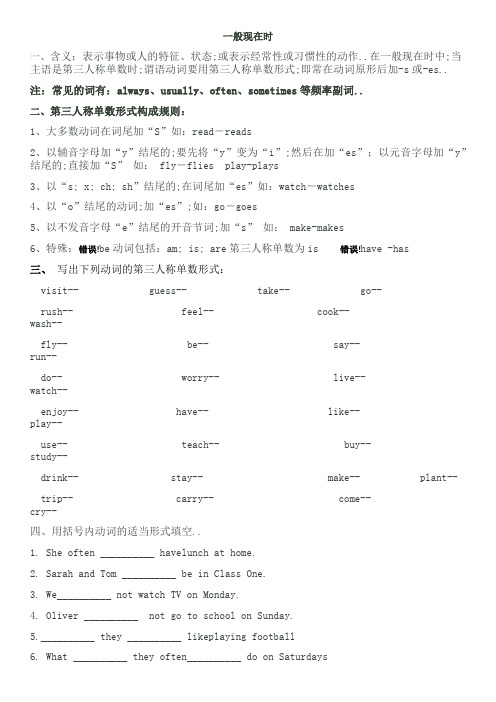一般将来时一般现在时现在进行时
(完整版)一般现在时、一般过去时、一般将来时、现在进行时

初中语法一般现在时、一般过去时、一般将来时、现在进行时四种时态的区别名称定义时间动词形式时间词always、sometimes、usually、1、动词原形often、every表示经常性或习2、第三人称单一般现在时平时、经常惯性的动作数morning、动词后-s/esevery week、twice a week等等now、rightnow、表示此时此刻或at theam/is/are+动词现在进行时现阶段正在进行正在进行ingmoment、的动作look、listen等in the future、1、will/shall+动next词原形表示将来发生的week/month、一般将来时即将、计划2、am/is/are事tomorrow、+going to+动词in two weeks原形等等ago、yesterday、表示过去某一时1、V-ed(规则last week/候或某一段时间过去(与现动词)一般过去时night、所发生的事情或在无关的)2、不规则动词just now、存在的状态变化once upon atime等注意:1、一般现在时——第三人称单数的动词变化规则:1)大多数动词在词尾加“S”如:stop-______; make-______read-______; play-______2)以辅音字母加“y”结尾的,要先将“y”变为“i”,然后在加“es”如:fly-______;carry-______study-______; worry-______3)以“s, x, ch, sh”结尾的,在词尾加“es”如:teach-______;watch-______4)以“o”结尾的动词,加“es”如:go-______do-______2、现在进行时——动词ing形式的变化规则1.一般动词直接在词尾+ing例:read→______(读)talk→______(交谈)sing→______(唱歌)2.以不发音e结尾的动词,先去e再加ing例:like→______喜欢write→______写skate→______(滑冰)3.以重读闭音节结尾且末尾只有一个辅音字母的动词,双写末尾字母,再加ing例:stop→______(停止)get→______(得到)4.少数几个以ie结尾的动词,变ie为f再加ing。
一般现在时,现在进行时,一般将来时

一般现在时,现在进行时,一般将来时一般现在时一、含义:表示事物(或人)的特征、状态,或表示经常性或习惯性的动作。
在一般现在时中,当主语是第三人称单数时,谓语动词要用第三人称单数形式,即常在动词原形后加-s或-es。
注:常见的词有:always、usually、often、sometimes等频率副词。
二、第三人称单数形式构成规则:1、大多数动词在词尾加“S”如:read-reads2、以辅音字母加“y”结尾的,要先将“y”变为“i”,然后在加“es”;以元音字母加“y”结尾的,直接加“S” 如: fly-flies play-plays3、以“s, x, ch, sh”结尾的,在词尾加“es”如:watch-watches4、以“o”结尾的动词,加“es”,如:go-goes5、以不发音字母“e”结尾的开音节词,加“s” 如: make-makes6、特殊:be动词包括:am, is, are第三人称单数为ishave -has三、写出下列动词的第三人称单数形式:visit--guess--take--go--rush--feel--cook--wash--fly--be--say--run--do--worry--live--watch--enjoy--have--like--play--use--teach--buy--study--drink--stay--make--plant--trip--carry--come--cry--四、用括号内动词的适当形式填空。
1. She often __________ (have)lunch at home.2. Sarah and Tom __________ (be) in Class One.3. We__________ (not watch) TV on Monday.4. Oliver __________ (not go) to school on Sunday.5.__________ they __________ (like)playing football?6. What __________ they often__________ (do) on Saturdays?7. __________ your parents __________ (read) newspapers?8. The girl__________ (teach) us English on Sundays.9. She and I __________ (take) a walk together every evening.10. There __________ (be) some water in the bottle.11. Mike__________ (like) cooking.12. He__________ (have) two new books.13. My sister __________ (look) after her baby carefully.14. You always __________ (do) your homework well.15. I__________ (be) ill. I’m staying in bed.16. She __________ (go) to school from Monday to Friday.17. Liu Tao __________ (do) not like PE.18. The child often __________ (watch) TV in the evening.19. -What day __________(be) it today?-It’s Saturday20.-How__________Dad __________(feel)?-He __________(feel) not well.21.-Where__________ he __________(work)?-He __________(work) at sea.现在进行时一、含义:表示正在做某事。
七个时态:一般现在时、现在进行时、将来时:begoingto(=will)、一般过去时、过去进行时、过去完成时、现在

主要要一下七个时态:一般现在时、现在进行时、将来时:be goingto(= will )、一般过去时、过去进行时、过去完成时、现在完成进行时。
(1)一般现在时1.一般现在时表示经常或习惯性的动作,也可表示现在的状态或主语具备的性格和能力。
2.一般现在时中,没有be动词和情态动词,主语为第三人称单数的肯定句,动词要按规则加上s,主语是非第三人称单数的肯定句,动词用原形。
3.在一般现在时中,句中有be动词或情态动词时,否定句在be 动词和情态动词后加not,一般疑问句将be动词或情态动词放在句4.在一般现在时中,句中没有be动词或情态动词时,主语为第三人称单数的否定句在动词前加does+not (doesn’t),一般疑问句在句首加does,句子中原有动词用原形;主语为非第三人称单数,否定句用do+not (don’t),一般疑问句在句首加do,句子中动词用原形。
5.动词+s的变化规则1)一般情况下,直接加-s,如:cook-cooks, milk-milks2)以s. x. sh. ch. o结尾,加-es,如:guess-guesses,wash-washes,watch-watches, go-goes3)以“辅音字母+y”结尾,变y为i, 再加-es,如:study-studies6. 句中be动词和动词一般情况下只能有一种而且也必须有一种。
如:The childrenare very happy on Christmas Day .7.一般现在时中的be动词:一般用原形:am is aream用于第一人称单数(I);is用于第三人称单数(he she it和其他人名或称谓,如:Ben his sister等);are用于第二人称单数(you)和所有复数(包括第一人称复数we、第二人称复数you;第三人称复数they和其他复数,如his parents等)。
8.一般过去时中的动词:有两种情况:第一种情况:主语是第三人称单数(he she it 和其他,如Helen 、her cousin 等),动词后一般加s或es。
五种时态一般现在时的_一般过去式_现在进行_现在完成时_一般将来时

• • • • • • • • • • • • • • • • • • • • • • • • • • •
( ) 19. The day after tomorrow they ________ a volleyball match. A. will watching B. watches C. is watching D. is going to watch ( ) 20. There ________ a birthday party this Sunday. A. shall be B. will be C. shall going to be D. will going to be ( ) 21. They ________ an English evening next Sunday. A. are having B. are going to have C. will having D. is going to have ( ) 22. ________ you ________ free next Sunday? A. Will; are B. Will; be C. Do; be D. Are; be ( ) 23. He ________ there at ten tomorrow morning. A. will B. is C. will be D. be ( ) 24. ________ your brother ________ a magazine from the library? A. Are; going to borrow B. Is; going to borrow C. Will; borrows D. Are; going to borrows ( ) 25. – Shall I come again tomorrow afternoon? –________ (好的). A. Yes, please B. Yes, you will. C. No, please. D. No, you won’t. ( ) 26. It ________ the year of the horse next year. A. is going to be B. is going to C. will be D. will is ( ) 27. ________ open the window? A. Will you please B. Please will you C. You please D. Do you
一般现在时、一般过去时、一般将来时、现在进行时句子结构

题目一般过去时,现在进行时,一般将来时,一般现在时的句子结构答案解析一、一般现在时结构:主语+ 谓语动词(实义动词或者是be动词)+ 宾语当主语是第三人称单数的时候,后面的谓语动词一定要变成动词的第三人称单数形式. 例:He has an English book.句子中的have 是动词原形,has则是have的第三人称单数形式二、现在进行时结构:be + v+ing + sthbe动词包括(am is are) 什么情况用哪个be动词是由主语决定的!当主语是第一人称“I ”的时候be 动词一定只可以用am当主语是单三的时候,be 动词要用is当主语是第二人称you 或者是其他的时候,be动词一定要用arev+ing 表示的是现在分词,也就是动词的ing 形式现在分词的变化形式:1.动词是以字母“e ”结尾的要去掉e 再+ ing2.直接在动词词尾+ing3.词尾是以一个元音字母加上一个辅音字母,且重读闭音节结尾的要双写辅音字母再+ing 例:play- playing take - takingdo - doing leave - leavingput - putting cut - cutting例:I am playing football with my classmates.He is watching TV at home.They are having an English class.三、一般将来时1.结构:be + going to +do sth例:I am going to do my homework tomorrow.He is going to babysit his sister.We are going to go shopping this weekend.2.will + v(原形)例:He will come back later.I will visit my grandparents next week.3.be + doing sth现在进行时也可以表示计划、打算要做的事情例:I am leaving for Shanghai next Sunday.四、一般过去时结构:主语+ 动词过去式(be 动词,或者实义动词) + 宾语例:I was a little girl 10 years ago.He went to the Great Wall last month.I visited my cousins last Saturday.。
一般现在时现在进行时般将来时

一般现在时一、含义:表示事物或人的特征、状态;或表示经常性或习惯性的动作..在一般现在时中;当主语是第三人称单数时;谓语动词要用第三人称单数形式;即常在动词原形后加-s或-es..注:常见的词有:always、usually、often、sometimes等频率副词..二、第三人称单数形式构成规则:1、大多数动词在词尾加“S”如:read-reads2、以辅音字母加“y”结尾的;要先将“y”变为“i”;然后在加“es”;以元音字母加“y”结尾的;直接加“S”如: fly-flies play-plays3、以“s; x; ch; sh”结尾的;在词尾加“es”如:watch-watches4、以“o”结尾的动词;加“es”;如:go-goes5、以不发音字母“e”结尾的开音节词;加“s”如: make-makes6、特殊:错误!be动词包括:am; is; are第三人称单数为is 错误!have -has三、写出下列动词的第三人称单数形式:visit-- guess-- take-- go-- rush-- feel-- cook--wash--fly-- be-- say--run--do-- worry-- live--watch--enjoy-- have-- like--play--use-- teach-- buy-- study--drink-- stay-- make-- plant-- trip-- carry-- come--cry--四、用括号内动词的适当形式填空..1. She often __________ havelunch at home.2. Sarah and Tom __________ be in Class One.3. We__________ not watch TV on Monday.4. Oliver __________ not go to school on Sunday.5.__________ they __________ likeplaying football6. What __________ they often__________ do on Saturdays7. __________ your parents __________ read newspapers8. The girl__________ teach us English on Sundays.9. She and I __________ take a walk together every evening.10. There __________ be some water in the bottle.11. Mike__________ like cooking.12. He__________ have two new books.13. My sister __________ look after her baby carefully.14. You always __________ do your homework well.15. I__________ be ill. I’m staying in bed.16. She __________ go to school from Monday to Friday.17. Liu Tao __________ do not like PE.18. The child often __________ watch TV in the evening.19. -What day __________be it today-It’s Saturday20.-How__________Dad __________feel-He __________feel not well.21.-Where__________ he __________work -He __________work at sea.现在进行时一、含义:表示正在做某事..注:常见的词有:now现在、look看、listen听等..现在进行时的构成:am/is/ are+ v-ing是现在进行时的构成形式v-ing现在分词的构成:let put sit ; stop shop ; forget get ; begin jog run swim让我们放下来;坐下来;停止购物;忘记取得;开始跑跑跳跳letting putting sitting stopping shopping forgetting getting beginning jogging running swimming二、写出下列动词的现在分词形式:visit-- put-- take-- go-- get-- see-- cook--wash--fly-- let-- say--swim--do-- sit-- live--watch--enjoy-- have-- run--play--use-- teach-- buy--study--drink-- stay-- make-- plant-- feel-- stop-- come--cry--三、用所给的动词的正确形式填空:1.The boy __________________ drawa picture now.2. Listen .Some girls __________________ singin the classroom .3. My sister __________________ swim now.4. What __________ you__________ do now5. Look . They __________________ have an English lesson .6.They__________________ not ;water the flowers now.7.Look The girls__________________ dance in the classroom .8.What is Tom doing She __________________ listen to music.9.It’s 5:00 now. I__________________ run.10.HearThe bird__________________sing.一般将来时一:含义:表示将来计划、准备、打算做某事..二:标志词:tonight今晚;tomorrow明天;the day after tomorrow后天;thismorning/afternoon/evening今天早上/下午/晚上;next week/weekend/month/year下一周/下一周末/下个月/下年; in two years两年后; three days later三天以后等..三:结构:(1)will/shall+do动词原形will可用于所有人称;shall只用于第一人称I和we(2) be going to+do动词原形be--am/is/are根据主语的变化而变化四、练习:填空..1. 我打算明天和朋友去野炊.. I_____ _______ _________ have a picnic with my friends.I ________ have a picnic with my friends.2. 下个星期一你打算去干嘛我想去打篮球..What ________ ________ _________ _________ _________ next MondayI _______ ______ _____ play basketball.What _________ you do next Monday I ________ play basketball.3. 你妈妈这个周末去购物吗是;她要去买一些水果.._____ your mother _______ ________ go shopping this ___________ Yes; she _________. She ______ ________ __________ buy some fruit.4. 你们打算什么时候见面..What time _______ you _________ __________ meet五、改句子..1、Tom is going to go camping.改否定→ Tom ________ going to go camping.2. I’ll go and join them.改否定→ I _______ go ______ join them.3. I’m going to get up at 6:30 tomorrow.改为一般疑问句→________ _______ ________ to get up at 6:30 tomorrow4. We will meet at school at 10:30.改为一般疑问句→_______ ________ meet at the bus stop at 10:30.5、. She is going to listen to music after school.对划线部分提问→ ________ _______ she ________ ________ _________ after school六:用所给词的适当形式填空..1. Today is a sunny day. We ___________________ have a picnic this afternoon.2. My brother _______________ go to Shanghai next week.3. Tom often ______________go to school on foot. But today is rain. He ______________ go to school by bike.4. What do you usually do at weekends I usually ________ watch TV.5. It’s Friday today. What _____she _________ do this weekend She ___________watch TV .名词的复数形式1.一般情况下;直接加-s;如:book-books; bag-bags; cat-cats; house-houses2.以s. x. sh. ch结尾;加-es;如:bus-buses; box-boxes; watch-watches3.以“辅音字母+y”结尾;变y为i; 再加-es;以“元音字母+y”结尾;直接加-s 如:family-families; toy-toys4.以-o结尾;一般在词尾加-es.如:tomato-tomatoes;potato-potatoes5.以“f或fe”结尾;变f或fe为v; 再加-es;如:knife-knives;wife-wives等6.不规则名词复数:1特殊变换:man-men; woman-women; policeman-policemen; policewoman-policewomen; mouse-mice;child-children; foot-feet;.tooth-teeth2单复数同行:fish-fish; people-people; Chinese-Chinese; Japanese-Japanese sheep-sheep bread-bread等等..3国人变复数:口诀“中日不变英法变;其余s加后面”:Chinese--Chinese;Japanese--Japanese;Englishman--EnglishmenFrenchman--Frenchmen American--Americans一、写出下列名词的复数形式1.orange__________2.class ___________3.monkey__________4.piano___________5.child___________6.shelf ____________7.bed____________ 8.country___________ 9.family___________10.toy__________ 11.foot __________ 12.radio__________13.photo__________ 14.tomato___________ 15.woman___________16.knife__________ 17.sheep__________ 18.ship__________19.dish___________ 20.mouse___________二、用所给的单词的复数的正确形式填空:1> There are three_____________chair in the classroom.2> These_____________ tomato are red.3> My brother looks after two_____________ baby4> My father likes to eat_____________ potato.5> Chinese_____________ peoplelike to eat noodles.6> I have a lot of _____________ toy in my bedroom.7> My mother wash_____________ dish in the kitchen.8> I have two_____________ pencil-box.9> There are some_____________ busin the street.10> Monster has eight_____________ foot.三、按适当形式填空..手写。
一般现在时、现在进行时、一般将来时、一般过去时知识点总结
一般现在时、一般将来时、一般过去时、现在进行时知识总结一、一般现在时一般现在时表示经常性或习惯性的动作,常与表示频度的时间状语连用,如often, usually, always, sometimes, never, seldom, every week/day/year/month..., once a week, on Sundays等。
动词用原形。
当主语为第三人称单数时(he, she, it, 一个人名),动词变为三单形式。
第三人称单数的动词变化规则:(只有在第三人称(he, she, it, 一个人名)为主语的肯定句中,动词才用三单式)(1)一般情况下,直接加s runs gets likes(2)结尾是s, x, sh, ch, o,前为辅音字母,结尾加es watches, goes, washes, crosses, mixes, does(3)动词末尾y,前为辅音,将y改为i加es study→studies fly→flies但在y前如果为元音则直接加s buys says plays(4)不规则变形have—has二、一般将来时一般将来时表示将来发生的事。
常与tomorrow, next day/week/month/year..., soon, in a few minutes, the day after tomorrow, in the future等时间状语连用。
Will/shall +动词原形;(shall用语第一人称)be(am/is/are) going to+ 动词原形三、一般过去时一般过去时表示过去某一时候或某一段时间所发生了的事情或存在的状态。
常与过去时间yesterday,ago, this morning,just now,a moment ago,last night / year / week/month,once upon a time,the other day,before,the day before yesterday, in 1989, at the age of five, one day, then(那时), on that day,in the past连用。
六上英语一般将来时,现在进行时,一般现在时,情态动词规则
六上英语一般将来时,现在进行时,一般现在时,情态动词
规则
以下是六上英语中一般将来时、现在进行时、一般现在时和情态动词的规则:
1. 一般将来时:
结构:will + 动词原形
示例:I will go to the park tomorrow.
2. 现在进行时:
结构:be (am/is/are) + 动词-ing
示例:They are playing basketball now.
3. 一般现在时:
结构:动词原形 (第三人称单数时加-s/-es)
示例:I go to school every day.
4. 情态动词:
can: 表示能力或可能性
示例:I can speak English.
may: 表示许可或可能性
示例:You may use the computer.
must: 表示必要或义务
示例:I must finish my homework.
shall: 表示建议或命令
示例:You shall stay out of the garden.
will: 表示意愿或将来时间
示例:I will help you.
这些规则是英语语法中的基础部分,需要不断练习和巩固。
如需更多信息,建议查阅语法书籍或咨询英语教师。
(完整版)一般现在时、一般过去时、一般将来时、现在进行时
初中语法一般现在时、一般过去时、一般将来时、现在进行时四种时态的区别注意:1、一般现在时——第三人称单数的动词变化规则:1)大多数动词在词尾加“S"如:stop-______ ; make-______ read-______ ; play-______2)以辅音字母加“y”结尾的,要先将“y”变为“i",然后在加“es”如:fly-______ ; carry-______ study-______ ; worry-______3)以“s, x, ch, sh”结尾的,在词尾加“es"如:teach-______ ; watch-______4)以“o”结尾的动词,加“es”如:go-______ do-______2、现在进行时——动词ing形式的变化规则1.一般动词直接在词尾+ing例:read→______ (读) talk→______(交谈) sing→______(唱歌)2。
以不发音e结尾的动词,先去e再加ing例:like→______喜欢 write→______写 skate→______(滑冰)3。
以重读闭音节结尾且末尾只有一个辅音字母的动词,双写末尾字母,再加ing 例:stop→______(停止) get→______(得到)4.少数几个以ie结尾的动词,变ie为f再加ing.例:lie→______(躺、撒谎) tie→______(系、捆绑)3、一般过去时——动词的变化规则(1)一般在动词后加-ed。
如:play-______, offer-______, weigh—______, destroy—______, sign—______(2)在以字母e结尾的动词后,只加-d。
如:like—______, provide-______, hate - ______ date-______(3) 在以“辅音字母+y”结尾的动词后,则改y为i,再加—ed。
一般将来时、一般现在时、现在进行时
七年级下册英语M3–M4时态复习一般将来时讲解一、概念:表示将要发生的动作或存在的状态及打算、计划或准备做某事。
句中一般有以下时间状语:tomorrow,nextday(week,month,year…),soon,thedayaftertomorrow(后天)等。
二、基本结构:①begoingto+do;②will+do.三、否定句:在be动词(am,is,are)后加not或will后加not成won’t.1.问人2.例:? 3.它们的用法是有区别的:1.begoingto主要用于:1)、表示事先经过考虑、安排好打算要做的事情。
E.g.Whatareyougoingtodotoday?今天你们打算做什么???I’mgoingtoplaytheviolin.我打算拉小提琴。
2)、表示根据目前某种迹象判断,某事非常有可能发生。
E.g.Look!Therecomethedarkclouds.Itisgoingtorain.瞧!乌云密集,天要下雨。
IamafraidIamgoingtohaveacold.恐怕我要患重感冒。
2.will主要用于在以下几个方面:1)、表示单纯的未来“将要”通用各个人称。
eg: Theywillgotovisitthefactorytomorrow.明天他们将去工厂参观。
2)、表示不以人的意志为转移的自然发展的未来的事。
eg: TodayisSaturday.??TomorrowwillbeSunday.今天是星期六。
明天是(将)是星期日。
Hewillbethirtyyearsoldthistimenextyear.明年这个时候他就(将)三十岁。
3)八.11.Mybrother_______________(go)toShanghainextweek.12.Tomoften____________(go)toschoolonfoot.Buttodayisraining.He______________(go)toschoolbybike.13.Whatdoyouusuallydoatweekends?Iusually__________(watch)TVand__________(catch)insects.14.It’sFridaytoday.What________she_________(do)thisweekend?She_________(watch)TVand_________(catch)insects.15.Mary____________(visit)hergrandparentstomorrow.二.选择题()1.Thetrain________at11.A.isgoingtoarriveB.willbearriveC.isgoingtoD.isarriving()2.Charlie________herenextmonth.A.isn’tworkingB.doesn’tworkingC.isn’tgoingtoworkingD.won’twork()3.He______verybusythisweek,he________freenextweek.A.willbe;isB.is;isC.willbe;willbeD.is;willbe()4.There______adolphinshowinthezootomorrowevening.A.wasB.isgoingtohaveC.willhaveD.isgoingtobe()5.–______you______freetomorrow?–No.I____freethedayaftertomorrow.()9.––七年级上英语时态复习一、?一般现在时:(1、现在的状态。
- 1、下载文档前请自行甄别文档内容的完整性,平台不提供额外的编辑、内容补充、找答案等附加服务。
- 2、"仅部分预览"的文档,不可在线预览部分如存在完整性等问题,可反馈申请退款(可完整预览的文档不适用该条件!)。
- 3、如文档侵犯您的权益,请联系客服反馈,我们会尽快为您处理(人工客服工作时间:9:00-18:30)。
七年级下册英语M 3 –M 4 时态复习一般将来时讲解一、概念:表示将要发生的动作或存在的状态及打算、计划或准备做某事。
句中一般有以下时间状语:tomorrow, next day(week, month, year…),soon, the day after tomorrow(后天)等。
二、基本结构:①be going to + do;②will+ do.三、否定句:在be动词(am, is, are)后加not或will后加not成won’t.例如:I’m going to have a picnic this afternoon.→ I’m not going to have a picnic this afternoon.四、一般疑问句:be或will提到句首,some改为any, and改为or,第一二人称互换。
例如:We are going to go on an outing this weekend.→ Are you going to go on an outing this weekend?五、对划线部分提问。
一般情况,一般将来时的对划线部分有三种情况。
1. 问人:Who例如:I’m going to New York soon. →Who’s going to New York soon.2. 问干什么: What … do.例如:My father is going to watch a race with me this afternoon. →What is your father going to do with you this afternoon3. 问什么时候:When.例如:She’s going to go to bed at nine. →When is she going to bed?六、同义句:be going to = willI am going to go swimming tomorrow(明天). = I will go swimming tomorrow.七、be going to和will 的区别be going to和will 的用法虽然都表示将来发生动作或情况,但它们的用法是有区别的:1. be going to主要用于:1)、表示事先经过考虑、安排好打算要做的事情。
.What are you going to do today 今天你们打算做什么I’m going to play the violin. 我打算拉小提琴。
2)、表示根据目前某种迹象判断,某事非常有可能发生。
.Look! There come the dark clouds. It is going to rain. 瞧!乌云密集,天要下雨。
I am afraid I am going to have a cold. 恐怕我要患重感冒。
2. will主要用于在以下几个方面:1)、表示单纯的未来“将要”通用各个人称。
eg:They will go to visit the factory tomorrow. 明天他们将去工厂参观。
2)、表示不以人的意志为转移的自然发展的未来的事。
eg:Today is Saturday. Tomorrow will be Sunday.今天是星期六。
明天是(将)是星期日。
He will be thirty years old this time next year. 明年这个时候他就(将)三十岁。
3)、问对方是否愿意做某事或表示客气地邀请或命令。
eg:Will you please turn on the radio 请打开收音机好吗Will you go to the zoo with me你和我一起去动物园好吗八. 趋向性动词下列动词: come, go, leave, arrive等词用一般现在时表示将来。
I am coming tomorrow. 我明天过来。
语法练习一.用所给单词的适当形式填空______(be) an American film next week._______(play) football with us tomorrow.week we ________(have) an English party.4. She begins________(do) her homework in the afternoon.my dream school there won’t be ________(some) dirty classrooms.________(go) back to Australia in three days.radio says it _______(rain) later on today.8. David ______________ (give) a puppet show next Monday.9. I ________________ (plan) for my study now.10. Today is a sunny day. We __________ (have) a picnic this afternoon.11. My brother _______________ (go) to Shanghai next week.12. Tom often ____________(go) to school on foot. But today is raining.He ______________ (go) to school by bike.13. What do you usually do at weekendsI usually __________ (watch) TV and __________(catch) insects.14. It’s Friday t oday. What ________she _________ (do) this weekendShe _________ (watch) TV and _________ (catch) insects.15. Mary ____________ (visit) her grandparents tomorrow.二.选择题( ) 1. The train ________ at 11.A. is going to arriveB. will be arriveC. is going toD. is arriving ( ) 2. Charlie ________ here next month.A. isn’t workingB. doesn’t workingC. isn’t going to workingD. won’t work ( ) 3. He ______ very busy this week, he ________ free next week.A. will be; isB. is; isC. will be; will beD. is; will be( ) 4. There ______ a dolphin show in the zoo tomorrow evening.A. wasB. is going to haveC. will haveD. is going to be ( ) 5. –______you ______free tomorrow – No. I ____free the day after tomorrow.A. Are; going to; willB. Are; going to be; willC. Are; going to; will beD. Are; going to be; will be( ) 6. Mother ________ me a nice present on my next birthday.A. will givesB. will giveC. givesD. give( ) 7. ________ a concert next SaturdayA. There will beB. Will there beC. There can beD. There are( ) 8. He ________ to us as soon as he gets there.A. writesB. has writtenC. will writeD. wrote( )9. – Will his parents go to see the Terra Cotta Warriors tomorrow– No, _______(不去).A. they willn’t.B. they won’t.C. they aren’t.D. they don’t.( ) he ___a kite in the open air first, and then ____boating in the park.A. will fly; will goB. will fly; goesC. is going to fly; will goesD. flies; will go ( ) 11. He ________ there at ten tomorrow morning.A. willB. isC. will beD. Be( ) 12. ______your brother ______ a magazine from the libraryA. Are; going to borrowB. Is; going to borrowC. Will; borrowsD. Are; going to borrows( )13. -----Will everyone study at home -----Yes, _______will.A. everyoneB. itC. ID. they( )14. Li Ming is 10 years old now, next year he _____11.A. isB. is going to beC. will beD. will to be( )15. We ________ home next Sunday.A. are going to go going C. are going to D. are going for◆七年级上英语时态复习一、一般现在时:(1、现在的状态。
2、经常或习惯性动作。
3、主语所具备的性格和能力。
4、真理。
